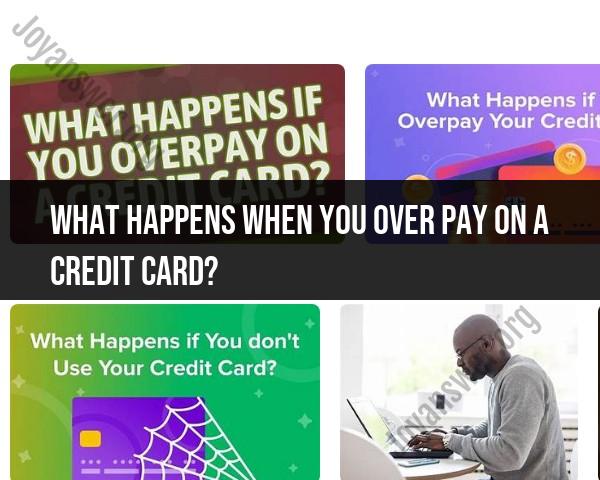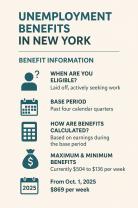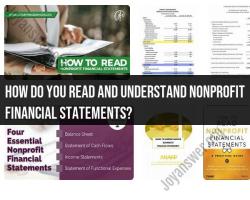What happens when you over pay on a credit card?
When you overpay on a credit card, it means you've paid more money than you owe on the card. Here's what you can generally expect to happen when you overpay:
Credit Balance: The excess amount you paid is treated as a credit balance on your credit card account. This means you have a positive balance, and the credit card issuer owes you money.
Options for Using the Credit Balance:
- Refund: You can request a refund of the credit balance from your credit card issuer. They can issue a check or transfer the funds to your bank account.
- Offset Future Charges: You can leave the credit balance on your account, and it will be applied to future purchases or charges on the card. This can be convenient if you want to reduce your credit card expenses over time.
- Transfer to Another Account: Some credit card issuers may allow you to transfer the credit balance to another credit card account you have with the same issuer.
Monitoring Your Account: Keep an eye on your credit card statements to ensure that the credit balance is correctly applied to future purchases or to verify that you received a refund if you requested one.
Avoiding Interest Charges: Overpaying a credit card does not exempt you from making future minimum payments if you have an outstanding balance. You may still owe interest on any unpaid balance, and you'll be required to make at least the minimum payment on your statement.
Expiration of Credit Balance: Credit card issuers may have policies regarding the expiration of credit balances. If you don't use the credit balance or request a refund within a certain period, the issuer may issue a check or take other actions to return the funds to you.
Contact Customer Service: If you're unsure about how to handle a credit balance or if you have specific preferences for how it should be managed (e.g., regular refunds), it's a good idea to contact your credit card issuer's customer service. They can provide guidance and help you make the necessary arrangements.
Keep in mind that policies regarding credit balances and overpayments can vary slightly between different credit card issuers, so it's a good practice to review your issuer's terms and conditions or contact their customer service for specific details. Overpaying your credit card is generally not a problem, but it's essential to understand how your credit card issuer handles such situations to ensure you receive the benefit you desire, whether it's a refund or the application of the credit to future charges.
What Happens When You Overpay on a Credit Card
When you overpay on your credit card, you are essentially paying more than the amount that is due. This can happen for a number of reasons, such as accidentally entering the wrong amount when making a payment, or returning an item that you purchased with your credit card.
If you overpay on your credit card, the excess amount will be credited to your account. This means that your balance will be reduced by the amount of the overpayment.
The Process of Overpayment and Its Consequences
When you make a payment to your credit card issuer, the payment is typically processed within a few business days. Once the payment has been processed, the excess amount will be credited to your account.
There are no negative consequences to overpaying on your credit card. However, it is important to note that you will not earn interest on the overpayment.
Options for Handling Credit Card Overpayments
If you overpay on your credit card, there are a few things you can do:
- Leave the overpayment on your account. This is the simplest option and it will help to reduce your balance.
- Request a refund. You can contact your credit card issuer to request a refund of the overpayment. The refund will typically be issued to you within a few business days.
- Use the overpayment to cover future charges. If you are expecting to make charges to your credit card in the near future, you can use the overpayment to cover those charges.
Avoiding Overpayments and Managing Your Card Balance
There are a few things you can do to avoid overpaying on your credit card:
- Double-check your payment amount before you submit it. Make sure that you are entering the correct amount when you make a payment online or over the phone.
- Use automatic payments. If you are forgetful, consider setting up automatic payments to have your credit card bill paid automatically each month from your checking account.
- Monitor your balance regularly. Review your credit card statements regularly to make sure that there are no errors and to track your spending.
Customer Support and Assistance for Overpayment Issues
If you have any questions or concerns about an overpayment on your credit card, you can contact your credit card issuer's customer support department. They will be able to help you understand your options and resolve the issue.
Here are some additional tips for avoiding credit card overpayments:
- Use a budgeting app. A budgeting app can help you track your income, expenses, and debt. This can help you to avoid overspending and ensure that you are making your credit card payments on time and in full.
- Set up financial goals. Having financial goals can help you to stay motivated to manage your money wisely. For example, you may have a goal of paying off your credit card debt in full or saving for a down payment on a house.
- Seek professional help if needed. If you are struggling to manage your credit card debt, consider seeking professional help from a financial advisor or credit counselor. They can help you develop a budget and debt management plan.












